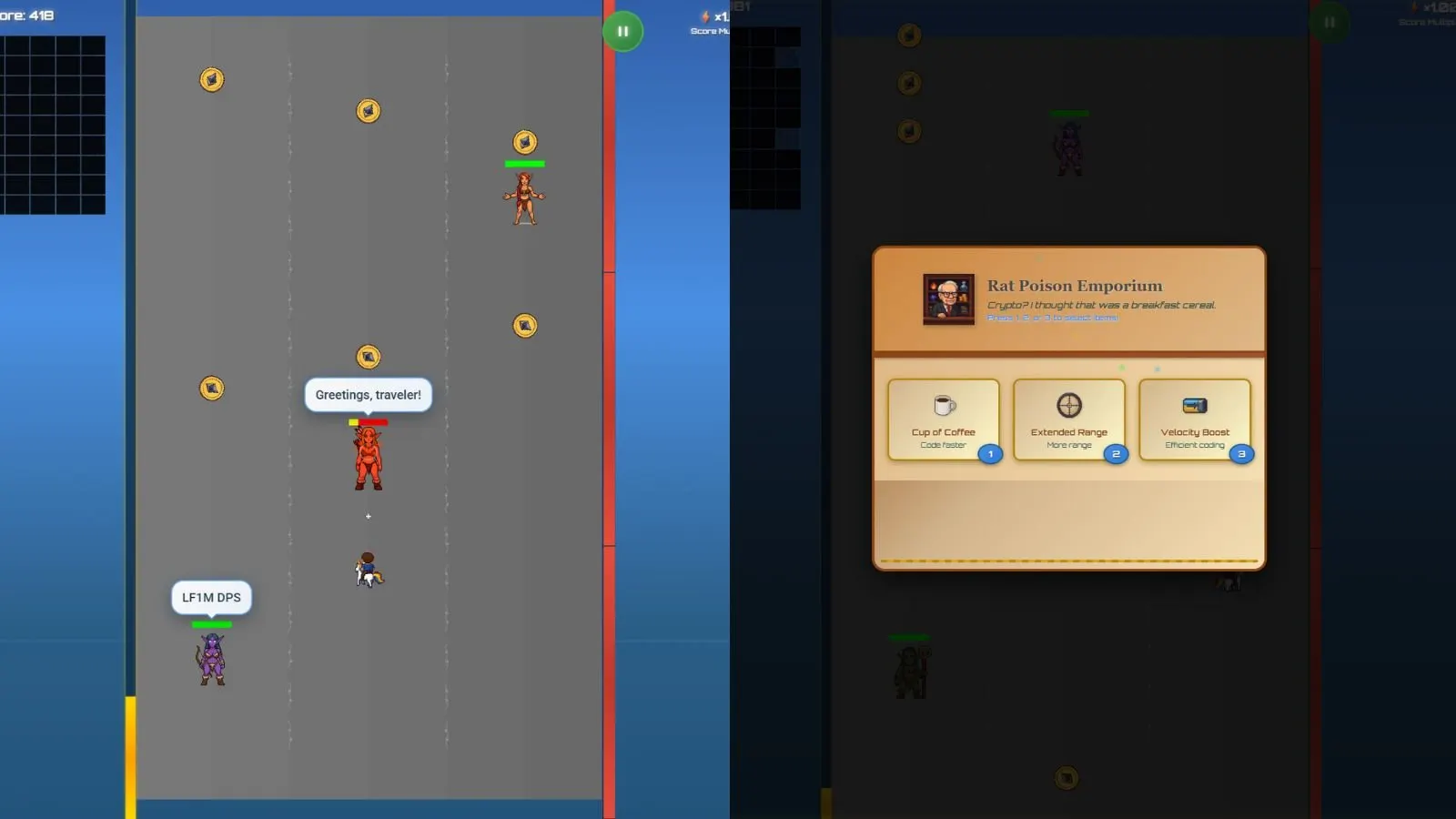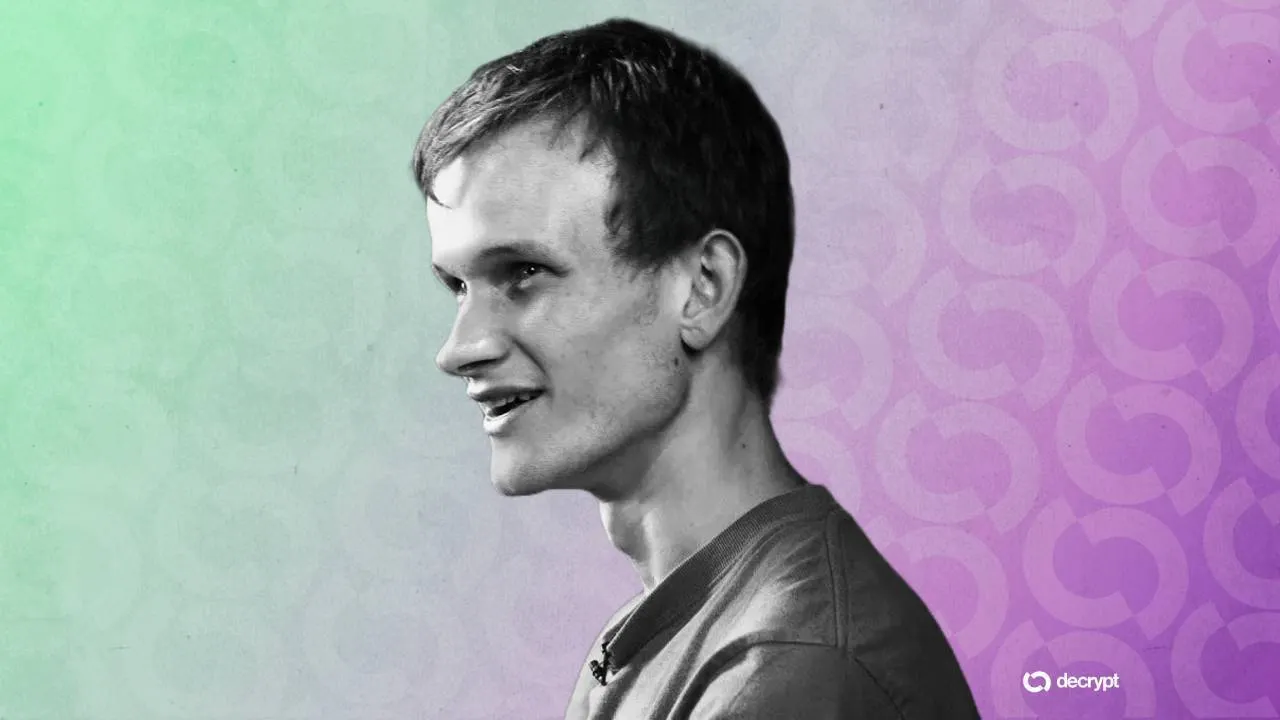In brief
- Vitalik.run is an endless roguelike runner with elements of Game Dev Tycoon, tracking Vitalik Buterin's journey of creating and leading Ethereum.
- The developer called it educational in a "South Park way." Players battle their way through creating the Ethereum whitepaper, the ICO craze, and avoiding World of Warcraft distractions.
- Despite being rooted in the crypto scene, the game features no blockchain elements as the dev wanted to solely focus on creating fun chaos.
An Israeli developer's new game lets players assume the role of Vitalik Buterin, attempting to write the Ethereum whitepaper while avoiding distractions. The dev says the game, which launched a day after the network celebrated its 10th birthday, aims to tell Ethereum’s story in a fun and chaotic manner.
Vitalik.run is an endless roguelike runner, creator Ruby Edelstein told Decrypt. Players need to fight enemies, avoid distractions like Blizzard’s acclaimed World of Warcraft, and progress in the story of Ethereum.
The Ethereum co-founder is famously a big fan of World of Warcraft. So much so that Buterin is said to have been inspired to create a decentralized network after his favorite World of Warcraft character was nerfed. According to a digital biography supposedly penned by Buterin, he cried himself to sleep following the nerf as he “realized what horrors centralized services can bring.”

“[Vitalik.run] is full of tiny and massive references, memes, and a lot of love and respect for the space,” Edelstein told Decrypt.
The game sees Buterin write the ETH whitepaper, assemble a team, fight off critics, launch mainnet, fix bugs, ride the ICO craze, and further—in that sense, it is reminiscent of Game Dev Tycoon.
“The Ethereum story has always felt like something truly epic; it’s shaped the space and has affected the trajectory of my life. Vitalik Run is my tribute to it,” said Edelstein, who most recently built the NFT bridge XP.Network. “I think it's educational in a South Park way.”
The game is easy to pick up, but difficult to master. Players use the arrow keys to switch between three lines, space bar to attack enemies, and the number keys to choose power-ups. But players are only granted one life: If you die, you’re sent back to the start.
At the time of writing, per the public leaderboard, the high score is 12,778, which Edelstein says isn’t very deep into the storyline. The developer estimates it’ll take a player approximately 45 minutes to complete the entire story.
“Vitalik is THE GUY, his journey of building Ethereum is the hero journey, he’s a total nerd kid with a dream, building in public, facing doubt, distractions, and still pushing through, getting shit done,” Edelstein explained. “In my eyes, he’s the crypto champion.”
Despite Vitalik.run being rooted in love for the crypto scene, it doesn’t use any blockchain features. The developer says this is because he wanted to focus on creating an enjoyable experience, but didn’t close the door to future crypto implementations.
“Crypto games try too hard to be financial products first and actual games second, which is totally backwards,” the Ethereum game creator told Decrypt. “Games are supposed to be fun; most of them miss that. We don’t need another ‘earn’ mechanic placed on top of something that is half ready.”
It’s been a rough year for crypto gaming, as many of the most notable projects have shut shop—often citing a lack of funding. Some experts, including John Linden, co-founder and CEO of Mythical Games, told Decrypt that 90% of traditional games fail anyway; it’s just that crypto games fail on a more public stage.
Issuing tokens or NFTs brings immense pressure to the game studio. In some cases, like with Fractional Uprising’s OpenSeason, investors’ deafening desire for the token to pump becomes a major distraction to the core experience. As a result, the co-founder of the studio called adding a token to game development “a fucking nightmare.”
“I didn’t want to overcomplicate things with crypto. Asking someone to connect a wallet requires a lot of trust, and that’s not the point here,” he added. “If there’s demand, I might add some on-chain elements later, but only if it makes it a better game.”

